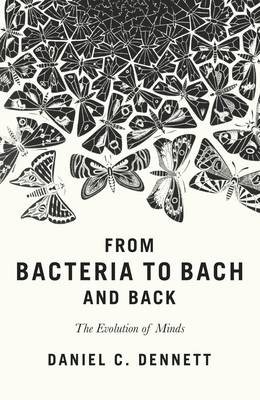
This article is a preview from the Autumn 2017 edition of New Humanist.
From Bacteria to Bach and Back by Daniel Dennett (Allen Lane)
Meticulously scientific and scientist-friendly, Daniel Dennett is first and foremost a philosopher, and this is the latest foray in his 50-year quest to establish an evolutionary understanding of the mind. Much of the book is therefore a re-statement of his entire thesis, updated with lessons learned and stripped of extraneous argument and digression. The humour and direct language make for a good read, and most of the referencing is left to background and bibliographic end matter: this is a good place to start if you’re new to Dennett.
The argument covers the evolution of life, from pre-biological physics and chemistry to the evolution of complex and intelligent life, including all that makes for human intelligence. That is, in other words, our consciousness: our thinking tools and our shared knowledge and behaviour. Analogous to genes in biological evolution, Dennett makes use of memes as the patterns of information that are replicated and transmitted between minds as ideas evolve, and as collections of ideas – memeplexes – evolve in culture. His emphasis, something also shared with many physicists these days, is on the fundamental importance of information. That is, information itself and free-floating patterns of information independent of any particular physical embodiment. Claude Shannon and Alan Turing are as evident as Charles Darwin here.
Dennett is no stranger to criticism, which falls into three main areas. First, that his explanation of consciousness overreaches from the materialism of physical science into human culture more generally. Second, that he fails to address the so-called “hard problem” that the subjective experience of consciousness cannot entirely be explained by the mechanisms of the mind. And third, that he doesn’t do enough work to address his critics’ objections.
In a 2013 New Humanist interview with Dennett, Caspar Melville noted that doing battle with critics was a “contact sport” that the author relished. In From Bacteria to Bach and Back, however, there is little direct argument aimed at them. Many critics of Dennett raise doubt that such materialist-scientific explanations treating memes as “scientific objects” could and should really be applied to culture and human values. “Life’s too short,” Dennett now says, to keep addressing such points.
Yet any rational scientific explanation of how the mind works, how consciousness arises from our clearly physical brains and bodies, will eventually bump up against culture and values: the non-material, non-scientific concerns of humanity. It must, if it is to succeed. In the past, Dennett’s recommendation has been to avoid reductionism – to avoid seeing physical layers as simply determining what happens in our mental realm. In From Bacteria to Bach and Back he asks us to suspend our disbelief and not jump to conclusions about the objects we think we’re dealing with. As he points out, this means being prepared to go around his arguments multiple times, with only partial definitions and understandings.
It may seem like Dennett’s argument is circular, but it is in fact “strange-loopy” in the terms of his erstwhile collaborator, the cognitive scientist Douglas Hofstadter. Each time we cycle through the argument, its basis will shift until it effectively becomes a new species of argument. As Dennett says, if you agree to argue only on your opponent’s basis, then you’ve already lost. He makes a bet that if we play the game his way then the “hard problem” and related worries about the boundaries of culture and science, the physical and the mental, the objective and the subjective, will turn out to stem from problems with our existing arguments.
This is a bold gesture, but Dennett is not asking us to change our fundamental or common-sense views of the physical world. Rather, he’s asking us to think again about how we conduct rational discourse. Personally, I bought Dennett’s bet many years ago, and even some of his critics share the hunch that he is on the right side of history. The real work is for the rest of us to get to grips with what makes for a good argument, when the object is our understanding of how we argue – with our minds. Our very rationality is at stake.

